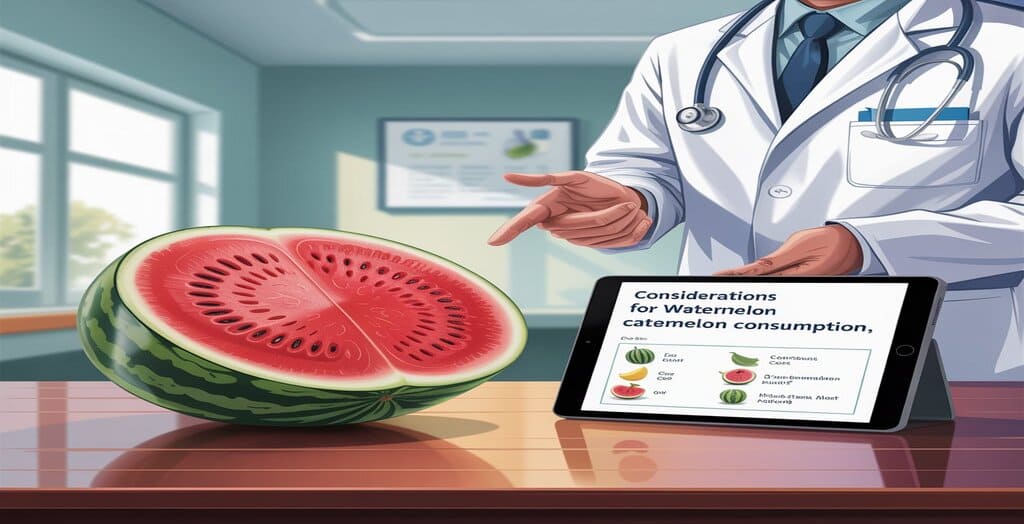
Introduction
Watermelon is a beloved summer fruit, known for its juicy sweetness, refreshing nature, and high water content. It’s often associated with hydration, detox, and even weight loss benefits. However, despite its reputation as a healthy snack, there are situations where watermelon may pose risks to your health. Eating too much, consuming it at the wrong time, or mixing it with certain medications and health conditions may lead to adverse effects.
In this article, we’ll explore in detail when watermelon can be harmful, highlight key health concerns, back them up with recent medical studies, and provide practical tips to consume watermelon safely.

The Nutritional Profile of Watermelon
Before discussing the downsides, it’s important to understand what watermelon contains:
| Nutrient (per 100g) | Amount |
|---|---|
| Calories | 30 kcal |
| Water | 91% |
| Sugar | 6.2g |
| Carbohydrates | 7.6g |
| Fiber | 0.4g |
| Vitamin C | 8.1 mg |
| Lycopene | 4.5 mg |
While these values highlight watermelon’s benefits, overconsumption or consumption under certain conditions can be problematic.
1. High Glycemic Index and Blood Sugar Spikes
Watermelon has a high glycemic index (GI) of around 72, which means it can raise blood glucose levels rapidly. Although its glycemic load (GL) is low per serving, individuals with diabetes or insulin resistance should be cautious.
🧪 A study published in The Journal of Nutrition (2022) found that fruits with a high GI, including watermelon, may contribute to post-meal hyperglycemia in diabetic patients if not portion-controlled.
Key Point :
People with type 2 diabetes, pre-diabetes, or metabolic syndrome should limit their watermelon intake to avoid blood sugar fluctuations.
2. Gastrointestinal Distress and Bloating
Watermelon contains sorbitol, a sugar alcohol that may cause gas, bloating, or diarrhea, especially in individuals with irritable bowel syndrome (IBS) or fructose malabsorption.
🩺 According to a clinical review by the American College of Gastroenterology (2023), high-sorbitol fruits like watermelon can trigger digestive symptoms in up to 35% of IBS patients.
Additionally, its high water content may dilute stomach acid, hindering digestion if consumed in large quantities after meals.
Key Point :
Individuals with sensitive digestive systems should avoid eating large portions of watermelon, particularly after heavy meals.
3. Overhydration and Electrolyte Imbalance
While hydration is vital, too much of it can lead to hyponatremia, a condition caused by low sodium levels in the blood.
Watermelon’s 91% water content can contribute to this when consumed excessively—especially during sports or hot weather when combined with plain water intake.
⚠️ A case published in the BMJ Case Reports (2021) described an incident where a marathon runner developed exercise-induced hyponatremia, partially triggered by excessive watermelon and water intake.
Key Point :
Moderation is essential—even for hydrating foods. Excessive watermelon consumption may dilute sodium levels, leading to fatigue, nausea, or confusion.

4. Potential Allergic Reactions
Though rare, watermelon allergies exist. Symptoms may include itchy throat, swelling of the lips or mouth, or even anaphylaxis in severe cases. These reactions are more common among individuals allergic to ragweed pollen or those with oral allergy syndrome (OAS).
🔬 According to the American Academy of Allergy, Asthma, and Immunology (AAAAI), cross-reactivity between ragweed and watermelon affects around 15% of pollen-allergic individuals.
Key Point :
Watch for allergic reactions, especially in those with pollen sensitivities or prior fruit-related allergies.
5. Interaction with Medications
Watermelon is rich in potassium, which, while beneficial for heart health, can interact with medications like beta-blockers or ACE inhibitors. These medications already raise potassium levels, and additional intake can lead to hyperkalemia (high potassium levels), posing a risk to heart and kidney function.
📘 A study in The Lancet (2023) emphasized that patients taking potassium-retaining drugs should monitor their dietary potassium, including from fruits like watermelon.
Key Point:
People on heart medications or with kidney disease should limit potassium-rich fruits, including watermelon.
6. Risk of Food Contamination and Infection
Watermelon is often consumed raw and is vulnerable to contamination with bacteria like Salmonella or E. coli, especially if improperly stored or handled.
🧫 A CDC report in 2022 linked a multi-state outbreak of Salmonella to pre-cut watermelon sold in supermarkets.
Key Point :
Always wash the outer rind before cutting, store slices in the refrigerator, and consume within 3 days to reduce bacterial risks.
7. Weight Gain When Overeaten
Though low in calories, watermelon is high in natural sugar and can cause weight gain if eaten in large amounts frequently, especially late at night.
⚖️ Harvard Health Publishing notes that eating high-sugar fruits in excessive quantities may interfere with weight loss goals, particularly in sedentary individuals.
Key Point :
Enjoy watermelon in moderation as part of a balanced diet, and avoid binge consumption, especially in sedentary lifestyles.
8. Tooth Enamel Erosion
The natural sugars and mild acidity of watermelon can contribute to tooth decay and enamel erosion if consumed frequently without proper oral hygiene.
🦷 A study in the Journal of Dental Research (2023) showed that regular exposure to fruit sugars increases the risk of plaque formation, especially when eaten as snacks between meals.
Key Point :
Rinse your mouth or brush your teeth after eating watermelon to protect your dental health.
Chart : When to Avoid or Limit Watermelon Consumption
| Health Condition | Recommended Action |
|---|---|
| Diabetes | Limit intake; monitor blood sugar |
| IBS or sensitive stomach | Avoid large portions |
| Kidney disease | Limit potassium-rich foods |
| Taking heart medications | Consult a doctor |
| Pollen or fruit allergies | Watch for allergic reactions |
| Seeking weight loss | Moderate consumption |
| Children under 1 year old | Avoid due to choking risk |
Conclusion
Watermelon is undeniably a delicious and hydrating fruit, rich in vitamins, antioxidants, and natural sugars. But like all foods, moderation is key. It can negatively impact health when consumed in excess or in certain medical contexts. From blood sugar issues and digestive discomfort to electrolyte imbalances and drug interactions, it’s essential to be aware of the hidden risks of watermelon.
To stay safe, consider your health condition, medications, and dietary needs before indulging. Always wash and store watermelon properly, and if in doubt, consult a healthcare provider for personalized advice.
References
- The Journal of Nutrition. (2022). Glycemic Effects of High GI Fruits in Diabetic Patients.
- American College of Gastroenterology. (2023). Fruit-Triggered IBS Symptoms and Sorbitol Sensitivity.
- BMJ Case Reports. (2021). Exercise-Induced Hyponatremia: A Case Linked to Excess Watermelon Intake.
- American Academy of Allergy, Asthma, and Immunology (AAAAI). Fruit and Pollen Cross-Reactivity.
- The Lancet. (2023). Potassium-Drug Interactions and Diet Considerations.
- Centers for Disease Control and Prevention (CDC). (2022). Salmonella Outbreaks Linked to Pre-Cut Fruit.
- Harvard Health Publishing. Fruit and Weight Control Guidelines.
- Journal of Dental Research. (2023). Effects of Natural Sugars on Oral Health.
- Wikipedia. Watermelon – Nutritional Content







